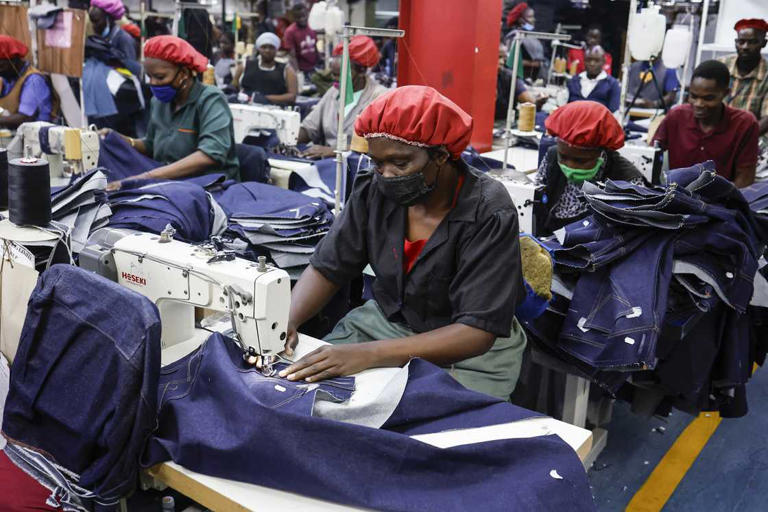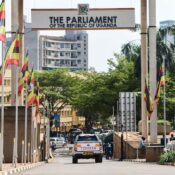
Kenya believes it can benefit from U.S. tariffs, yet the threat of a global recession is on the horizon
Kenya is one of the exporters anticipating that a lesser impact from Trump tariffs compared to competitors could position them favorably in the emerging global trade conflict, yet turning this difference into a tangible benefit will be a challenging endeavor.
As governments globally reacted to U.S. President Donald Trump’s new tariffs, Kenya expressed hope regarding possible benefits over competing textile manufacturers in Asia.
Imports from the East African nation, which exported goods valued at $737 million to the United States last year, will incur a minimum charge of 10%, in contrast to 46% for Vietnam, 44% for Sri Lanka, and 37% for Bangladesh.
“Trade Minister Lee Kinyanjui stated last week that, with other textile-exporting countries encountering significantly higher tariffs, Kenya has the opportunity to establish itself as an alternative sourcing hub for buyers.”
Economists indicated that emerging manufacturers in East Africa, such as Tanzania and Ethiopia, might also gain advantages, along with Latin American nations like Brazil, which similarly received the baseline 10% tariff.
Any benefits for Kenya, however, may be counterbalanced by the impact of tariffs on the global economy, along with persistent vulnerabilities in its domestic business landscape.
J.P. Morgan increased its forecast for a global recession by year-end to 60% from 40% on Friday following China’s response to U.S. tariffs, while Goldman Sachs has adjusted the likelihood of a U.S. recession in the next 12 months to 45% from 35%.
The chairman of Kenya’s largest garments manufacturer expressed concerns that the tariffs would increase expenses for companies that are already dealing with costs approximately 20% higher than their global competitors due to high electricity prices and taxes. He also raised doubts about whether international brands would be eager to relocate their operations.
“A temporary tariff disparity does not foster genuine competitiveness,” stated Pankaj Bedi, whose United Aryan Ltd. supplies U.S. retailers such as Target (TGT.N), Walmart (WMT.N), and Levi’s (LEVI.N).
Manufacturers are facing increased pressures due to the bleak prospects surrounding the African Growth and Opportunity Act (AGOA), a U.S. trade initiative established in 2000 that permits duty-free exports for numerous products from Africa.
Trade experts indicated that the U.S. tariffs were likely to mark the conclusion of AGOA, which is set to expire in September and had been anticipated to be renewed in some capacity.
Discussions with Washington
The tariffs cast a shadow over the global economy, impacting almost all of Kenya’s trading partners.
According to a note from J.P. Morgan on Monday, many African countries maintain relatively modest export balances with the U.S., while enjoying more substantial trade relations with the European Union and China.
In 2023, Kenya’s exports to the EU reached $1.35 billion, while exports to China amounted to $228 million, as reported by U.N. data.
“Although the direct effects on the U.S. may be minimal, the indirect consequences stemming from a possible growth slowdown in the EU and China, contingent on the actual impact of U.S. tariffs, could still burden these economies,” stated J.P. Morgan.
In addition to his optimistic initial evaluation, Kenya’s trade minister Kinyanjui also acknowledged the serious turmoil affecting global markets on Monday.
“We expect a significant impact across all sectors, and I believe the concerns about recession present a clear challenge, particularly for developing countries,” he stated.
Certain manufacturers indicated that Kenya might find it challenging to benefit from any opportunities created by the tariffs, as their elevated costs significantly offset the advantages offered by U.S. tariff rate differentials compared to competitors.
The Kenya Association of Manufacturers stated, “Kenya’s exports to the USA, which were previously duty-free under AGOA, will now incur additional costs, diminishing their market competitiveness.”
Other manufacturers were, however, maintaining an optimistic outlook. Jaswinder Bedi, whose company produces garments for American wholesalers, stated his intention to move forward with a new factory that would increase his workforce to over 3,000 employees.
“Our comparative advantage has indeed grown,” he stated. “Observe our rival nations … their tariffs are exceedingly high.”
The outcome will largely hinge on Kenya and its rivals’ capacity to obtain more favorable terms via direct negotiations with Washington.
On Sunday, U.S. Treasury Secretary Scott Bessent stated that over 50 nations had initiated discussions with the U.S. following Trump’s announcement of tariffs last Wednesday.
It remained unclear whether Kenya was included in that group. One textile manufacturing competitor was actively seeking to reverse the tariffs, as Vietnam’s leader To Lam agreed during a phone call on Friday with Trump to explore a potential deal.
In 2020, Kenya initiated trade deal negotiations with the first Trump administration.
Under President Joe Biden’s administration, new discussions commenced regarding a trade and investment partnership focused on reducing non-tariff barriers to trade; however, these talks were not finalized before Trump resumed office.
All Categories
Recent Posts
Tags
+13162306000
zoneyetu@yahoo.com



